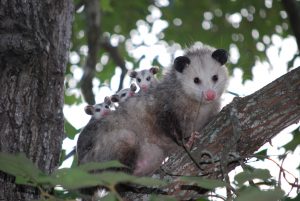 The Opossum is a mammal about the size of a house cat. It has moderately long fur with color that ranges from white to dark gray and is frequently darker on the legs and lighter on the back. It’s face is long and pointed with dark, rounded, paper-thin, hairless ears.
The Opossum is a mammal about the size of a house cat. It has moderately long fur with color that ranges from white to dark gray and is frequently darker on the legs and lighter on the back. It’s face is long and pointed with dark, rounded, paper-thin, hairless ears.
Opossums are the only marsupials (pouched mammals) in North America. Except for females with young, opossums are solitary animals. They are omnivores and eat a wide variety of food including fruits, vegetables, nuts, meat, eggs, insects, pet food and garbage.
These animals are found in many different habitats from woodlands to highly developed residential areas. In urban areas they have been found living in attics, garages, chimneys, wood piles, under houses or decks, or any place that offers protection. Although they’re very common in urban areas, opossums are not often seen due to their nocturnal habits.
Damage
When opossums live in or near inhabited buildings, the animal’s smelly nesting habits and discharge of anal fluids can cause offensive odors. Opossums can damage buildings by pushing in screened vents and window screens, scattering insulation, and chewing electrical wiring. They frequently get into garbage and may injure pets or expose them to disease in disputes over pet food. Opossums also prey on wild birds and baby rattlesnakes.
Disease
Opossums are carriers of many diseases: tuberculosis, relapsing fever, herpes virus, tularemia, salmonella, spotted fever, toxoplasmosis, coccidiosis, trichnomoniasis, Chagas Disease, yellow fever, and rabies (rarely). They are important reservoirs of leptospirosis (hemorrhagic jaundice) in wildlife and humans. Leptospirosis is transmitted through the urine and feces of infected animals. Humans frequently pick up the disease by eating unwashed produce or windfall fruit or by putting unwashed hands to their mouth. Opossums are also heavily infested with fleas, ticks, mites and lice which are know carriers and transmitters pf disease.
Problem Prevention
Opossums, like many wild animals are attracted to suburban areas due to easy access to food, water and shelter. Reducing or eliminating the availability of these elements will encourage opossums to leave.
See Helpful Hints on the Wildlife page.
Laws and Regulations
Opossums are not native to California. It’s a violation of California law for any wildlife to be kept as pets. Only authorized wildlife rehabilitators may keep injured or orphaned wildlife and then only for limited periods of time. California Fish and Wildlife Regulations prohibit the relocation of opossums and other wildlife without written permission of the Department. For further information on the legal status of opossums and other wildlife, contact your California Department of Fish and Wildlife Regional Office.
For additional information and photos, use Google Search.
Search for opossum, opossums